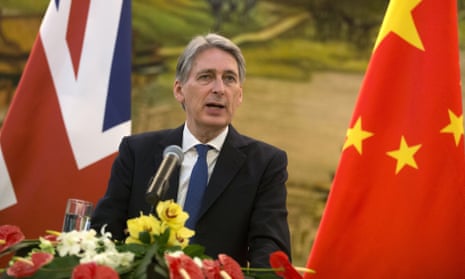China has committed a “serious breach” of a longstanding bilateral treaty, the British government has said, after finding that a missing bookseller was likely to have been “involuntarily removed” from the former colony of Hong Kong.
In a six-monthly report to parliament, foreign secretary, Philip Hammond, wrote that Lee Bo, a British passport holder who disappeared from Hong Kong in late December, was likely to have been taken to China against his will.
“Our current information indicates that Mr Lee was involuntarily removed to the mainland without any due process under Hong Kong SAR law,” Hammond wrote in a foreword.
The comment is far stronger than some of the previous observations by the foreign secretary. During a visit to Beijing in January, he waved off suggestions that Lee had been abducted, telling reporters “You are speculating a little bit about what has happened.”
Despite the report’s strong wording, human rights advocates and some legal scholars have criticised it, calling it a “tepid” response to what they see as China’s rapid erosion of liberties in the former British colony.
The “Six-monthly report on Hong Kong” covers the period from July through to December 2015, when five Hong Kong booksellers went missing, possibly abducted. It was also a period when civil society groups raised alarms about Beijing’s interference in Hong Kong’s elections, media ownership and appointments to academia.
“I am concerned that the report expresses a seemingly neutral view of many alarming developments in Hong Kong,” said Michael C. Davis, a law professor at the University of Hong Kong, in an email on Friday.
He noted that under the 1984 Sino-British joint declaration, the UK is obligated to ensure China protects free speech and other legal commitments in Hong Kong. “It is alarming that the British government rarely finds its voice as the erosion of these commitments over the past couple of years continues at a rapid pace,” he said.
Nicholas Bequelin, east Asia director for Amnesty International, said he was disappointed the report didn’t “connect the dots” on threats to speech and academic freedom. But Bequilin said it was encouraging to see the UK government stress the seriousness of the bookseller’s disappearances, which the report described as an “involuntary removal”.
“I am not sure this language has ever been used in a report,” said Bequelin. “It should make every member of parliament sit up and recognise this is a very serious breach of the joint declaration.”
In an introduction to the 32-page report, Hammond noted concerns about compromised academic and press freedoms. But he said he was particularly concerned about Lee, a British citizen and bookseller, who went missing after his wife had said he had been abducted.
Hammond said UK government officials had contacted their Chinese counterparts “at the highest level” but still did not have clarity on who or what caused the disappearances.
“The full facts of the case remain unclear, but our current information indicates that Mr Lee was involuntarily removed to the mainland without any due process under Hong Kong SAR law,” Hammond is quoted as saying in the report. “This constitutes a serious breach of the Sino-British joint declaration on Hong Kong and undermines the principle of ‘one country, two systems’ which assures Hong Kong residents of the protection of the Hong Kong legal system.”
No new details have been provided on who might have “removed” Lee. In January, after reporting her husband had been kidnapped, Lee’s wife said he had called her from Shenzhen, on the mainland. She said he had told her he was safe and was cooperating with authorities on an investigation.
Despite some of the language, the report concludes that Hong Kong’s “one country, two systems” governance has, “in the vast majority of areas, continued to function well”.
The report noted that UK companies secured more than £1.1bn in business in Hong Kong during the first three quarters of 2015, including contracts in rail, airports, a sports stadium and other infrastructure.
In recent years, UK prime minster David Cameron’s government has put a special emphasis on improving diplomatic and economic ties with China. Critics say the government is sidestepping Beijing’s human rights record as part of a calculated strategy to drum up more business in China.
Davis said the issue in Hong Kong was bigger than just protecting British passport holders. “Snatching a bookseller off the streets for exercising his freedom of expression is more than just a matter of diplomatic protection for Britain,” he said.
